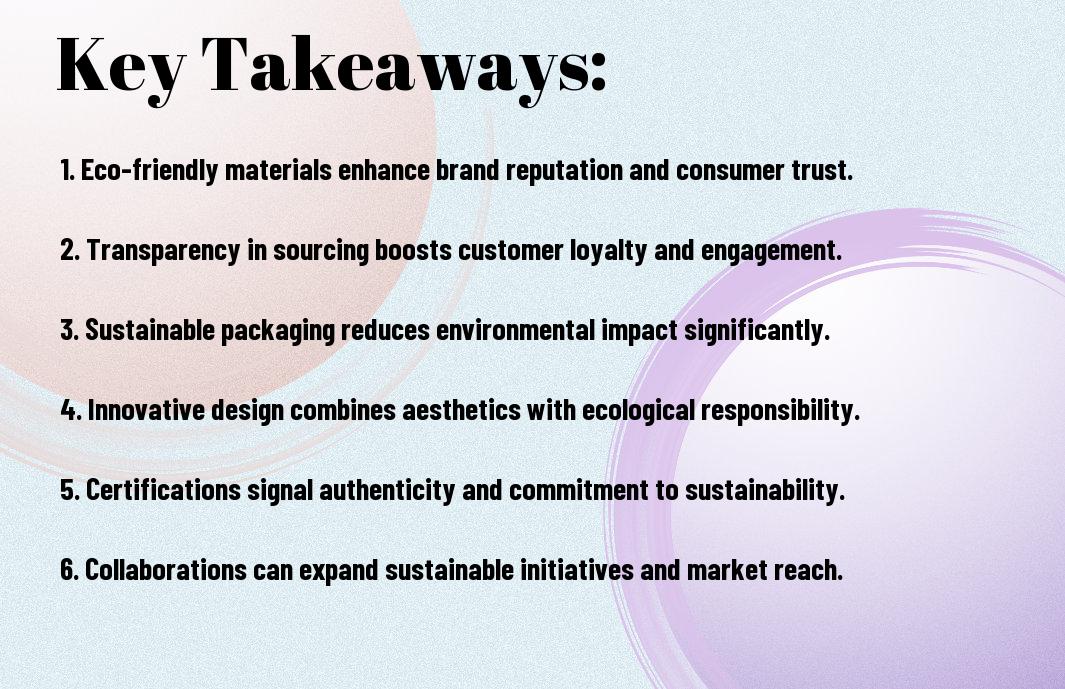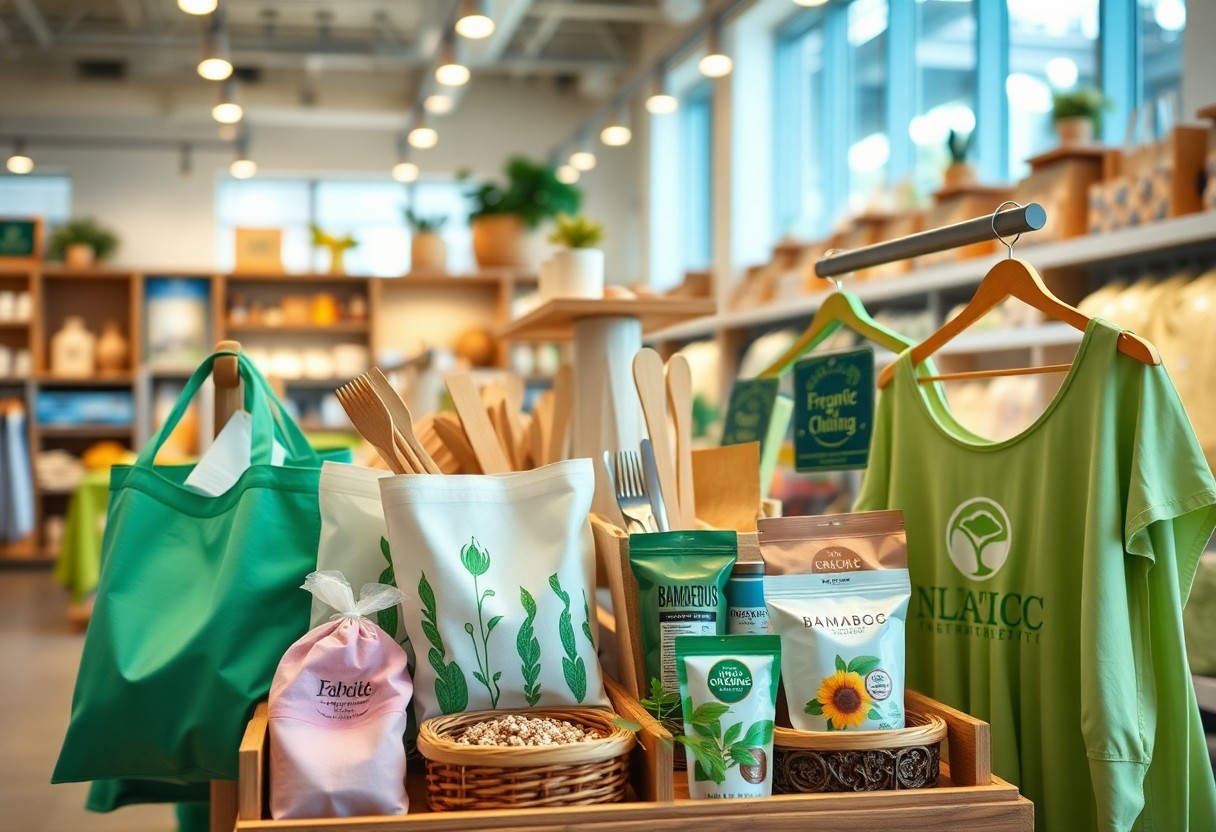You’re looking for ways to make a positive impact on the environment, and your purchasing decisions can be a powerful tool. You want to support brands that share your values. Check out The Game Changers: 50 Top Sustainable Brands to discover companies making a difference. You’ll find innovative products that not only reduce waste but also promote eco-friendly living, helping you make informed choices for your lifestyle.
Key Takeaways:
To stay ahead in the market, many top brands are focusing on sustainability and eco-friendliness. Here are some key points about top brands making sustainable products:
- Top brands are incorporating renewable materials into their products to reduce their carbon footprint and promote environmental conservation.
- Many brands are adopting circular business models, which involve designing products and services that are restorative and regenerative by design.
- Innovative technologies are being used by top brands to develop sustainable packaging solutions that reduce waste and minimize pollution.
- Some top brands are focusing on sustainable manufacturing processes, which involve using renewable energy sources and reducing water consumption.
- Top brands are also emphasizing transparency and accountability in their sustainability reporting, which helps to build trust with their customers and stakeholders.
Leading the Way
Your search for sustainable products leads you to brands that prioritize the planet. They’re making a difference with eco-friendly materials and practices.
Patagonia’s Environmental Efforts
Eco-friendly practices are at the core of Patagonia’s mission. You see this in their use of recycled materials and regenerative farming methods.
Reformation’s Sustainable Fashion
Efficient practices drive Reformation’s approach to sustainable fashion. You notice this in their transparent supply chain and environmentally-friendly clothing lines.
But as you dive deeper into Reformation’s sustainable fashion, you find a brand that’s constantly innovating. They use renewable energy, reduce water waste, and implement recycling programs, making your purchase a vote for a more sustainable future.

Innovative Materials
If you’re looking for sustainable products, you’ll find innovative materials at the forefront. You’ll discover brands pushing boundaries with eco-friendly designs and production methods, reducing waste and promoting recycling.
Nike’s Use of Recycled Materials
Behind the scenes, Nike is working to reduce waste by using recycled materials in their products, and you can be part of this movement by choosing their sustainable offerings.
Adidas’ Parley Ocean Plastic
Beside other brands, Adidas stands out with its Parley Ocean Plastic initiative, which you can support by selecting products made from ocean waste, helping to reduce plastic pollution.
Due to Adidas’ efforts, you can now find shoes and apparel made from recycled ocean plastic, giving you a chance to contribute to a cleaner environment with your purchasing decisions, and you can feel good about the products you buy.
Reducing Waste
All brands are taking steps to reduce waste, and you can see the impact in their sustainable products. You’re supporting companies that care about the planet when you buy from them.
L’Oréal’s Zero Waste Program
Against the backdrop of growing environmental concerns, L’Oréal has launched a zero waste program, aiming to eliminate waste in their operations, and you can be part of this change by choosing their products.
Unilever’s Sustainable Packaging
Beside other initiatives, Unilever is focusing on sustainable packaging, using recyclable materials and reducing plastic use, which you can support by making conscious choices in your daily life.
Zero waste is the goal, and Unilever’s sustainable packaging is a step in the right direction. You can help by recycling and reusing their packaging, reducing your own waste and making a positive impact on the environment.
Energy Efficiency
Keep in mind that reducing energy consumption is key to a sustainable future. You can see this in practice with brands investing in renewable energy sources and eco-friendly products.
LEGO’s Renewable Energy Initiative
On the path to sustainability, LEGO has made significant strides, investing in wind turbines and solar panels to power their facilities, reducing your carbon footprint.
IKEA’s Solar Panel Installation
With a focus on energy efficiency, IKEA has installed solar panels on their stores, generating power and reducing reliance on non-renewable energy sources, making your shopping experience more sustainable.
Hence, as you consider IKEA’s solar panel installation, you’ll find that it’s not just about reducing energy costs, but also about promoting a cleaner environment, and you can be part of this initiative by supporting brands that prioritize sustainability.

Sustainable Practices
Unlike other companies, you’ll find that top brands are prioritizing sustainability in their products and operations. You can see this in their eco-friendly materials, reduced waste, and environmentally responsible manufacturing processes.
Starbucks’ Coffee Sourcing Program
Sourcing high-quality coffee beans is just the start for Starbucks. You’ll see that they’re committed to sustainable farming practices, supporting farmers and their communities, and reducing their environmental impact.
Coca-Cola’s Water Conservation Efforts
On the path to sustainability, Coca-Cola is making strides in water conservation. You’ll notice that they’re working to reduce water usage in their operations and promoting water conservation throughout their supply chain.
Conservation is key for Coca-Cola, and you’ll see that they’re investing in technologies and practices that help reduce water waste and protect this precious resource. You can learn from their efforts and apply similar principles to your own life, making a positive impact on the environment.
Emerging Trends
Despite the challenges, you’re seeing a shift towards sustainability in the market. You’re looking for brands that reduce waste and minimize environmental impact. This trend is driving innovation, and you’re benefiting from it.
Biodegradable Products
To tackle plastic waste, you’re turning to biodegradable products. You’re opting for alternatives that break down naturally, reducing harm to the environment. This choice is making a difference, and you’re part of the solution.
Circular Economy Business Models
Products designed for reuse and recycling are gaining traction. You’re embracing a new way of consuming, and it’s changing the market. This approach is reducing waste, and you’re supporting brands that prioritize sustainability.
Models like product-as-a-service and sharing platforms are becoming more popular. You’re rethinking ownership, and it’s liberating. By adopting these models, you’re reducing your environmental footprint, and that’s a step in the right direction.
Final Words
With this in mind, you see the impact of your purchasing decisions. You choose sustainable products from top brands, making a difference. Your support drives innovation, pushing companies to create eco-friendly goods. You play a key role in shaping the future, and your choices matter.
FAQ
Q: What are some top brands that are making a significant impact with their sustainable products?
A: Some top brands that are making a significant impact with their sustainable products include Patagonia, Reformation, and Seventh Generation. Patagonia is known for its environmentally-friendly outdoor gear, Reformation is a fashion brand that prioritizes sustainability in its clothing production, and Seventh Generation offers a range of eco-friendly household and personal care products. These brands are committed to reducing their environmental footprint and promoting sustainability in their operations and supply chains.
Q: How are these top brands implementing sustainable practices in their product development and manufacturing processes?
A: These top brands are implementing sustainable practices in their product development and manufacturing processes in a variety of ways. For example, Patagonia uses recycled materials in its products, such as recycled polyester and regenerative farming practices. Reformation uses sustainable materials, such as Tencel and organic cotton, and has implemented a recycling program for its clothing. Seventh Generation uses plant-based ingredients and biodegradable materials in its products, and has reduced its packaging waste by using minimal and recyclable packaging. These brands are also prioritizing energy efficiency, reducing water usage, and implementing fair labor practices in their supply chains.
Q: What benefits can consumers expect from choosing sustainable products from these top brands, and how can they make a positive impact on the environment?
A: Consumers can expect several benefits from choosing sustainable products from these top brands, including reduced environmental impact, improved product quality, and alignment with their personal values. By choosing sustainable products, consumers can help reduce greenhouse gas emissions, conserve natural resources, and promote fair labor practices. Additionally, many of these brands offer take-back programs, recycling initiatives, and educational resources to help consumers make more sustainable choices. By supporting these brands and their sustainable products, consumers can make a positive impact on the environment and contribute to a more sustainable future. They can also influence other companies to follow suit and prioritize sustainability in their operations, leading to a broader positive impact on the environment and society as a whole.


